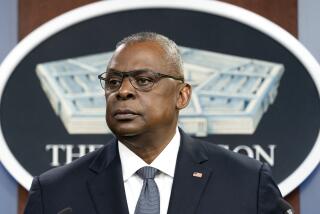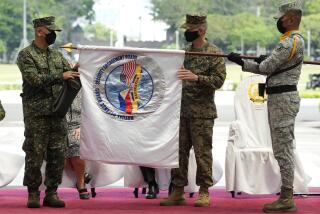Deeper U.S. Role in Asia Urged
- Share via
WASHINGTON — Defense Secretary Donald H. Rumsfeld said Tuesday that he has resisted authorizing increased U.S. military activity in the Philippines despite repeated recommendations by senior commanders that American soldiers become more directly involved in the search for Abu Sayyaf guerrillas holding two American hostages.
Rumsfeld said he has not decided whether to extend a joint military exercise, begun Jan. 15, in which Army Green Berets are training the Philippine military in a combat zone on Basilan island, home to an estimated 80 to 100 of the Muslim separatist fighters.
However, with the mission scheduled to end next month, Rumsfeld expressed concern that U.S. soldiers might be put at risk on a mission that could simply prompt the rebels to move their operations elsewhere. Abu Sayyaf guerrillas have been linked to Osama bin Laden’s terrorism network.
Rumsfeld’s reluctance to expand the Green Berets’ mission highlights the limitations of the Bush administration’s deployment of forces to combat terrorism, even in areas where the United States has enduring relationships.
In a speech Saturday to West Point graduates, President Bush reiterated his view that an expansive war on terrorism across international frontiers is necessary. Although the U.S. presence has quelled Abu Sayyaf’s activities, according to Philippine commanders, Pentagon officials have determined that simply being there is not enough. That realization leaves the U.S. with a choice: Keep troops in trouble spots, at the risk of American lives, or leave and possibly embolden terrorists who are in hiding.
“You can improve the situation in one place by your presence, but unless you get the terrorists, you have not improved the situation net in the world,” Rumsfeld said at a Pentagon briefing. “And there has been very little of getting terrorists in the Philippines thus far.”
The mission--to train the Philippine army at the battalion level, which includes hundreds of soldiers--is restricted to Basilan island and the nearby port of Zamboanga. U.S. soldiers in the southern province of Mindanao, which includes the island and the port, are prevented from going on smaller patrols with Philippine soldiers in search of the guerrillas.
Although the Philippine Constitution prohibits foreign troops from engaging in combat in the nation except in self-defense, the mere presence of the Americans could encourage an attack by rebels, Rumsfeld said.
Senior military officials have recommended expanding U.S. participation in the effort to track down the rebels who kidnapped American missionaries Martin and Gracia Burnham in May 2001. Among those calling for a greater U.S. role are the former head of the U.S. Pacific Command, Adm. Dennis Blair, and his replacement, Adm. Thomas Fargo.
Rumsfeld acknowledged Tuesday that Marine Gen. Peter Pace, vice chairman of the Joint Chiefs of Staff, who was at his side for the briefing, also recommended a wider role for the U.S. military.
U.S. Army officials in the Philippines said recently that they were prepared to become more involved if they were asked. They take credit for helping to shut down Abu Sayyaf’s activities on Basilan, including massacres of villagers who refused to assist the rebels.
“They’re nonfunctional as an organization,” U.S. Army Brig. Gen. Donald Wurster, the commander of U.S. soldiers in the region, said in a recent interview. “As I look around, I can see the difference.”
Expanding the mission would require the approval of both countries’ defense officials.
Yet, in his most candid statements to date on the military exercise, Rumsfeld indicated that he saw little reason to do so.
“I need a greater comfort level that I understand what I am recommending to the president this country get involved in--in terms of people, in terms of dollars and in terms of potential benefit,” he said.
More to Read
Sign up for Essential California
The most important California stories and recommendations in your inbox every morning.
You may occasionally receive promotional content from the Los Angeles Times.












